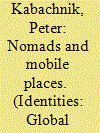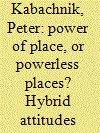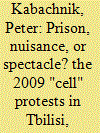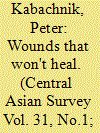|
|
|
Sort Order |
|
|
|
Items / Page
|
|
|
|
|
|
|
| Srl | Item |
| 1 |
ID:
113871


|
|
|
|
|
| Publication |
2012.
|
| Summary/Abstract |
Though there is a danger that 'place' may become subsumed or ignored in research as attention now shifts to questions of 'mobility,' discussion of place has burgeoned throughout academia. Many texts declare that place is important, or proclaim the power of place. While place has been shown to be a fundamental part of human existence, what does this then mean for those who are characterized as not being interested in places? Examining nomadic Gypsies and Travelers in Britain, who are often constructed as placeless, highlights that this is not simply a representational concern, but has a tangible empirical affect, impinging on their everyday practices as well as influencing policies and laws that actively deny them their right to place. By exploring various definitions of place and how this impacts the understanding of mobilities, I demonstrate that the meaning ascribed to nomads is dependent upon a spatialized definition of place which is underpinned by the space-place binary. It is this aspect of the discourse that allows for nomads to be constructed as out-of-place wherever they are, and by recognizing this we can avoid framing placelessness as a natural characteristic of nomadism. Reconceptualizing place allows for more nuanced understandings of nomadism, as our identities are constructed in relation to both place and mobility, not just one or the other.
|
|
|
|
|
|
|
|
|
|
|
|
|
|
|
|
| 2 |
ID:
159259


|
|
|
|
|
| Summary/Abstract |
This article explores the hybridity of commemoration by analysing people’s attitudes to three types of contested Soviet symbols in post-Soviet Georgia. I draw on 62 in-depth qualitative interviews conducted in 2012–2013 with Georgians in Tbilisi, Georgia. These interviews focused on what people thought about places of memory, Soviet symbols in public space, and memory politics and policies in contemporary Georgia. I examine their opinions of three different types of reminders of the Soviet past in public space: general Soviet symbols; street names; and the Stalin monument in Gori. This analysis reveals their diverse understandings of place and highlights the hybridity of their responses to the different elements of Soviet symbolism. This not only prevents one from creating ideal typologies when considering places of memory, but also highlights the impact of the form and location of the symbol. I also identify two ways that people conceptualize place, one that recognizes the power of place, and the other that perceives place as powerless.
|
|
|
|
|
|
|
|
|
|
|
|
|
|
|
|
| 3 |
ID:
121431


|
|
|
|
|
| Publication |
2013.
|
| Summary/Abstract |
For over three months in 2009 demonstrations took place in front of the Georgian Parliament on Rustaveli Avenue in Tbilisi, the capital of the Republic of Georgia. The protest involved a unique production of urban space as makeshift prison "cells" were placed in the landscape. The cells emerged following calls by the host of a popular reality television show, Cell #5. In order to illustrate the multiple meanings that people have of terrains of resistance, I highlight three dominant associations that people attributed to the cells: the prison metaphor; a public nuisance; and a spectacle. This case clearly exemplifies how popular culture will not only impact people's geopolitical understandings of the world but can directly alter the landscape and transform and encourage oppositional politics in a direct and immediate manner.
|
|
|
|
|
|
|
|
|
|
|
|
|
|
|
|
| 4 |
ID:
110790


|
|
|
|
|
| Publication |
2012.
|
| Summary/Abstract |
This paper examines the role of territorial integrity narratives in the Republic of Georgia, which currently features two separatist territories - Abkhazia and South Ossetia - which are de facto independent and have begun to receive limited international recognition. Political rhetoric is further buttressed by various government policies and practices that help transmit the message of territorial integrity to the Georgian public. Cartographic anxieties, or the preoccupation and fear of a country's loss of territory, is a central feature of Georgian nationalist discourse. Referring to the loss of territory as amputation exemplifies the cartographic anxieties displayed in Georgia. Specifically, I will focus on the role of political discourse, maps, patriotic youth camps and billboards and other elements of the landscape, documenting how they help to reproduce the discourse of territorial integrity. It is precisely these discourses and practices that reproduce territorial integrity narratives and construct the entire Georgian territory (including Abkhazia and South Ossetia) as integral to Georgian national identity, enabling the separatist regions to be understood as wounds that won't heal.
|
|
|
|
|
|
|
|
|
|
|
|
|
|
|
|
|
|
|
|
|